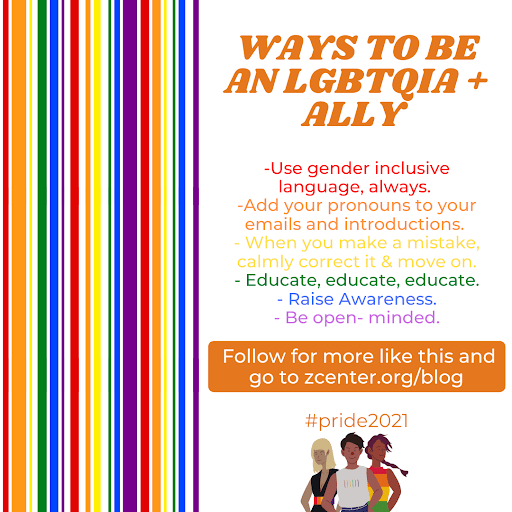Ally. What does that word really mean? By definition, we know that it’s one person, group, or nation united with another in a common purpose. France and England were allies in World War II, Katniss and Rue were allies in The Hunger Games, and today, there’s a larger discussion on being an ally to the LGBTQIA+ community. In this case, being an ally means that you don’t identify as part of the community yourself, but you support, unite, and advocate for them. Now, let’s pick apart each of these actions, emphasizing what being an ally truly means.
Support is the foundation for being an ally to any community; you understand the issues they are facing, you empathize with them, and you take a position that is in line with what they advocate for. So how can we be the best supporters we can be? When it comes to the LGBTQIA+ community, it’s imperative that we educate ourselves on the struggles that they face and the history behind movements that have directly affected them. Do we know about Stonewall and the various Supreme Court Cases that have quite literally debated if members of the community are offered equal protection as cisgender, straight people? Have we informed ourselves of historical and present struggles that the community faces in other countries? Have we ever taken a look at feminist and queer activisms throughout time? Now, it’s understandable that each of these may not be completely accessible, which is why it’s equally as important to be able to talk with members of the LGBTQIA+ community. Listen to their stories, their struggles, and their feelings. Discuss what they want, what they hope to achieve. In order to form support, we must understand and educate ourselves first.
Unite is a way we can show our support. When we think of unity, we think of standing together. That’s exactly what this is, but how can we show unity? Here, we’re walking a fine line between solidarity and performance activism. In order to differentiate between the two, we must ask ourselves: are we doing this for the right reasons? Do we truly believe in and support this cause? If we are true allies, we will not hesitate to show our support, even when it may impact us directly. For example, let’s consider displaying our pronouns. This was originally done by non-cisgender people as a way to avoid being misgendered; however, it soon became a way to target and harm them. In order to combat this, allies also started putting pronouns in social media bios, in email signatures, and more in order to normalize the practice. When I added pronouns into my Instagram bio, a mutual had actually told me that I should remove them because it will “make people think you’re gay or trans or something.” Here, we see the issue of performance activism vs. unity. This friend had claimed to be a proud supporter of the LGBTQIA+, but they couldn’t even do this in fear of being mistaken for being gay or trans. As a result, they just emphasized what so many members of the community are scared of: that being who they are is something they should be ashamed of. This is just one example of how we can achieve unity. If we want to be good allies, we must prioritize the feelings of the community over how something might make us look.
Advocate is how we can combine both support and unity. Advocacy does involve activism, but it also means just being there for the community. It means being willing to listen, offer advice, and support people’s decisions. As someone who is always quick to rush to action, I often find myself needing to take a breath and listen. What you think is the best course of action may be something unthinkable for someone else. As allies, we might never be able to truly understand the struggles that the LGBTQIA+ community faces without directly experiencing them, which is what makes listening so important. We must be careful not to center issues around ourselves; respecting the wishes of the people we stand for is one of the most principal aspects of being an advocate. So how can we be allies to the LGBTQIA+ community? The answer lies in supporting, uniting, and advocating. As long as we are putting our utmost effort, compassion, and open-mindedness into what we do, we will be continuously working on how we can be the best allies we can be.
Below is a list of tips and ideas for how we can start becoming an LGBTQIA+ Ally.
Continue to educate yourself and others.
Just like any other topic, there is always new information to be learned! It is important to know the different identities that people are a part of. The SafeZone Training presentation by LGBTQ+ Center Lake County is a great place to start to learn more terminology, vulnerability to sexual violence, solidarity, and allyship. We at ZCenter also offer training including this information as do many other agencies in different states and counties. Become familiar with your LGBTQIA+ Community partner near you.
Allow space and be a listener.
Have conversations, hear their stories, learn the history. Allowing space for another person to voice their hardships, experiences, challenges, and successes creates a foundation for not only further educating yourself but also being an ally to that person.
Be inclusive.
Use gender inclusive language. Introduce yourself with your pronouns. Use other’s preferred pronouns when they are given. Make sure that forms and surveys have gender inclusive language. When you make a mistake, calmly correct it and move on.
Be open minded.
When someone walks into the same room as you, do not make assumptions about anything. Be open minded and start a conversation by introducing yourself with your pronouns to allow them to also share their pronouns. Assuming someone’s gender identity just by the way they dress, look, talk, walk, can lead to being closed minded and not allowing for conversation.
Raise awareness.
Change your language no matter who you are around. Attend Pride events. Correct/Educate close friends or family members when appropriate. Listen to podcasts, shows, documentaries, movies, etc. surrounding the LGBTQIA+ community.
June is Pride Month. Follow us on TikTok and Instagram for more information and ways to be an Ally!
Written by Dana Drozek, Education and Outreach Specialist, and Vindhya Kalipi, Intern, University of Illinois.
All ZCenter blog posts are written by state certified staff, interns, and volunteers. For questions on authorship or content, please email kjones@zcenter.org.

